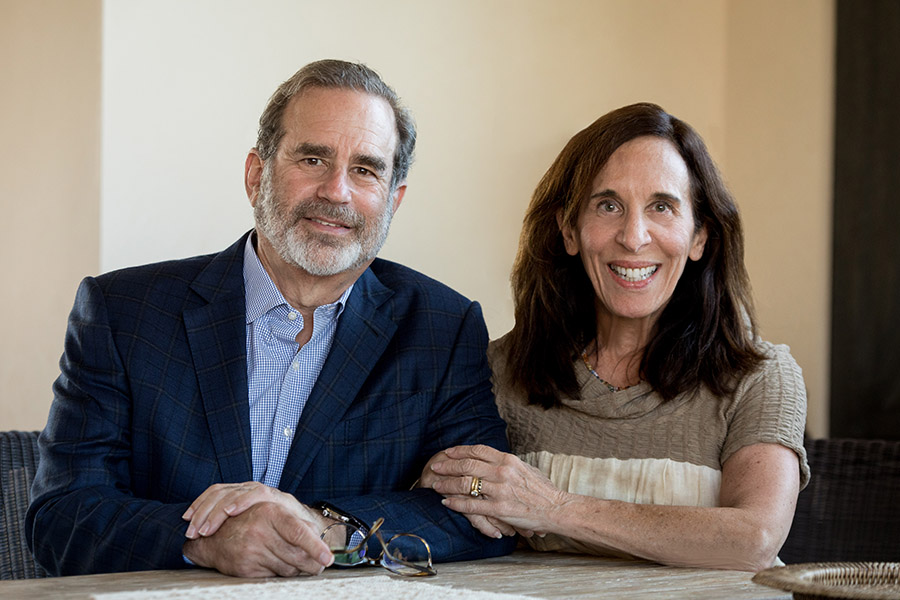Sigals Establish Rising Star Professorship in Industrial Engineering
| Author: | Philip Thornton |
|---|
When asked why he wants to support associate and assistant professors in industrial engineering, Elliott said, “I would like to give back to Purdue engineering because it was so impactful for me. I know what it’s like to be on faculty early in a career; you are trying to get post-doctoral students to take on high risk projects and you need, in addition to grants, discretionary money to fund new ideas. It can make a huge difference when launching a career.”
Rising Star Professorships are awarded to assistant or associate professors who have demonstrated exceptional accomplishments and leadership in research, teaching and engagement. These professorships are a form of recognition awarded for a limited term of three years or until the awardee is promoted to Full Professor, whichever is earlier. The Elliott Sigal Rising Star Professorship will be the fourth for the School of Industrial Engineering.
Elliott Sigal and his four siblings were raised in Indianapolis where their father was a research chemist at Eli Lilly. Both his father and his mother strongly encouraged education and career planning. “Discussing our career interests was a regular conversation at the dinner table,” Elliott said. Since there were five children there were two natural choices for college-- Purdue or Indiana University. He recalls his father saying, “If you want to study engineering, you need to attend Purdue. For anything else, you can go to IU.” Elliott took that advice, as did his brother, David. “My Dad was so focused on education and encouraging our future path that even though he got sick and died while I was still in high school, he left behind recommendations for all four years of my Purdue curriculum.”
Elliott’s father emphasized that engineering would be a great foundation for any career. “Being an engineer instills a unique, problem-solving approach,” Elliott explained. “It’s rigorous, it’s quantitative; you set performance measures, and you evaluate alternative solutions. You view the world differently compared to many other disciplines.” Elliott spent eight years in West Lafayette earning a B.S.I.E, a M.S.I.E, and a Ph.D in operations research studying under Alan Pritsker. During this time he also co-founded, with Alan Pritsker and David Wortman (BSIE 1973, MSIE 1977), the computer simulation consulting company, Pritsker and Associates, Inc. However, the loss of his mother to cancer during this period caused Elliott to reevaluate his career direction. “I began to think how my education could contribute to medical research and how an engineer could approach healthcare and medicine. I wanted to do that with the experience of being a physician.” Elliott left West Lafayette and entered medical school at the University of Chicago in 1977.
It was at the University of Chicago that Elliott met Ruth. They were married their last year in Chicago and set out for the University of California where Elliott trained in internal medicine and pulmonary medicine. After several years as a faculty member and a physician in the school of medicine, Elliott entered the biopharmaceutical industry.
Having both an understanding of industrial engineering and medicine was a benefit to his career focused on large scale projects aimed at developing novel therapies. Eventually, Elliott headed research and development at Bristol-Myers Squibb as executive vice president and chief scientific officer from 2004 through 2013. He managed an organization with over 5,000 scientists, 100,000 patients in clinical trials and a vast global organization with a multi-billion dollar budget and an extensive portfolio of projects. The industrial engineering background combined with medical training was a unique advantage in tackling the problems in research and development productivity. “The challenges posed by a large, complex global organization engaged in projects with inherent high failure rates and significant costs are challenges an IE is uniquely equipped to tackle.” Under his leadership, 14 new medicines were introduced to the market in disease areas ranging from cancer, infectious disease, rheumatology, cardiovascular disease and diabetes. In addition, Elliott’s team pioneered a new approach to cancer therapy which aims to recruit an individual’s immune system to fight the disease. This new field of immuno-oncology is changing the way cancer drugs are developed and patients with cancer are treated.
Elliott retired from Bristol-Myers Squibb in 2013. He and his wife Ruth returned to California where he devotes his time to advising the next generation of biotechnology leaders making the next generation of medicines.

